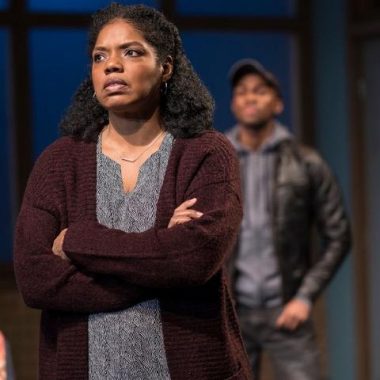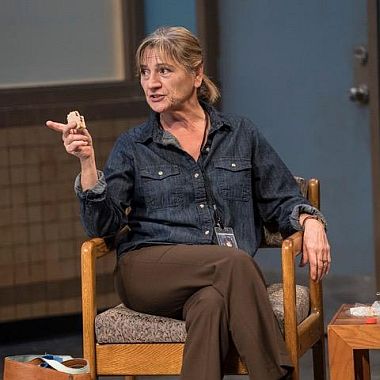
2 1/2 stars
In 90 short, uninterrupted minutes, playwright Dominique Morisseau lays out how the direct route from school to prison has become the American norm for young, black men. That is, if they’re not being gunned down by some trigger-happy police officer.
This is the hopeless existence depicted by the playwright of such important dramas as “Sunset Baby,” “Skeleton Crew” and the upcoming musical, “Ain’t Too Proud—the Life and Times of the Temptations.”
In director Cheryl Lynn Bruce’s new production at Victory Gardens Theater, a topic the playwright explored in a solo documentary, “Notes From the Field,” is starkly played out upon Andrew Boyce’s sparse, flexible scenic design. It’s a theatrical environment that wisely offers more focus upon the characters than the setting.
Tyla Abercrumbie, as Nya, commands the audience as a stressed out teacher at a crowded urban high school, a place where the security guards are just as important as the instructors. Coping with dozens of violent infractions every day is almost de rigueur.
Besides dealing with difficult students, Nya is a poorly paid, divorced single mother. She has tried hard to protect her teenage son, Omari, by getting him out of this dangerous environment and sending him to a private boarding school.
Now Nya has to address her son’s recent personal problem, while enduring the overbearing bullying of her estranged husband, Xavier, a man who’s been all but missing from his son’s life.

Also at Nya’s school is Laurie, a white, middle-aged teaching veteran who’s just returned from some extended time off. She’s been healing from facial reconstructive surgery. Apparently, after failing one of her students, she was slashed pretty badly by the kid’s angry family.
As the weeks pass, Laurie’s endured problem after problem at school. The last straw is when she had to resort to using a broom in order to break up a fight between two fighting students.
The security team, represented by Dun, was addressing another problem on campus, at that time; but Laurie’s anger and frustration at receiving no backup has left her facing a possible dismissal for how she handled the violent situation.
Meanwhile, Omari’s personal problems have affected his relationship with his doting mother. In addition, he’s been involved in a violent incident with one of his instructors, and this incident has bred further resentment and alienation toward and with his domineering father.
Omari has decided to break off the relationship with his girlfriend, Jasmine, while the young man and his mother try to determine what’s the next best step.

Also a writer on the TV series “Disgraced,” Dominique Morisseau’s gritty play is tempered a bit by Nya’s love of language. She uses the poetry of Gwendolyn Brooks in her teaching to jolt her students to life. “We Real Cool: the Pool Players Seven at the Golden Shovel” opens the play as we observe Nya shocking her class (the audience) into paying attention.
This production boasts strong performances from some of its cast, particularly Tyla Abercrumbie, as Nya, Janet Ulrich Brooks, as Laurie, and Mark Spates Smith, as Xavier. Abercrumbie grabs theatergoers from the beginning and never releases them until the end.
Ronald L. Conner lightens the mood with his lighthearted portrayal of Dun. Later we come to fully understand the danger of working as the security guard at a public school. His playful bantering with Brooks’ Laurie offers the much-welcome comic moments in this play.
Smith’s Xavier plays a terror. He’s so forceful and frightening that we’re thankful that his ex-wife and son have severed their relationship with him, except for financial help. There’s very little love involved.
The production is interesting and manages to shed some much-needed light on a hopeless situation. Morisseau’s play shows the tragic path that leads young black men, either to prison or to an early death.
It just feels disconnected and sometimes in a struggle to effectively drive the playwright’s point home. The drama itself is frustratingly unresolved and, as such, not as completely satisfying to the audience for whom this drama is intended.
For more shows visit Theatre in Chicago
